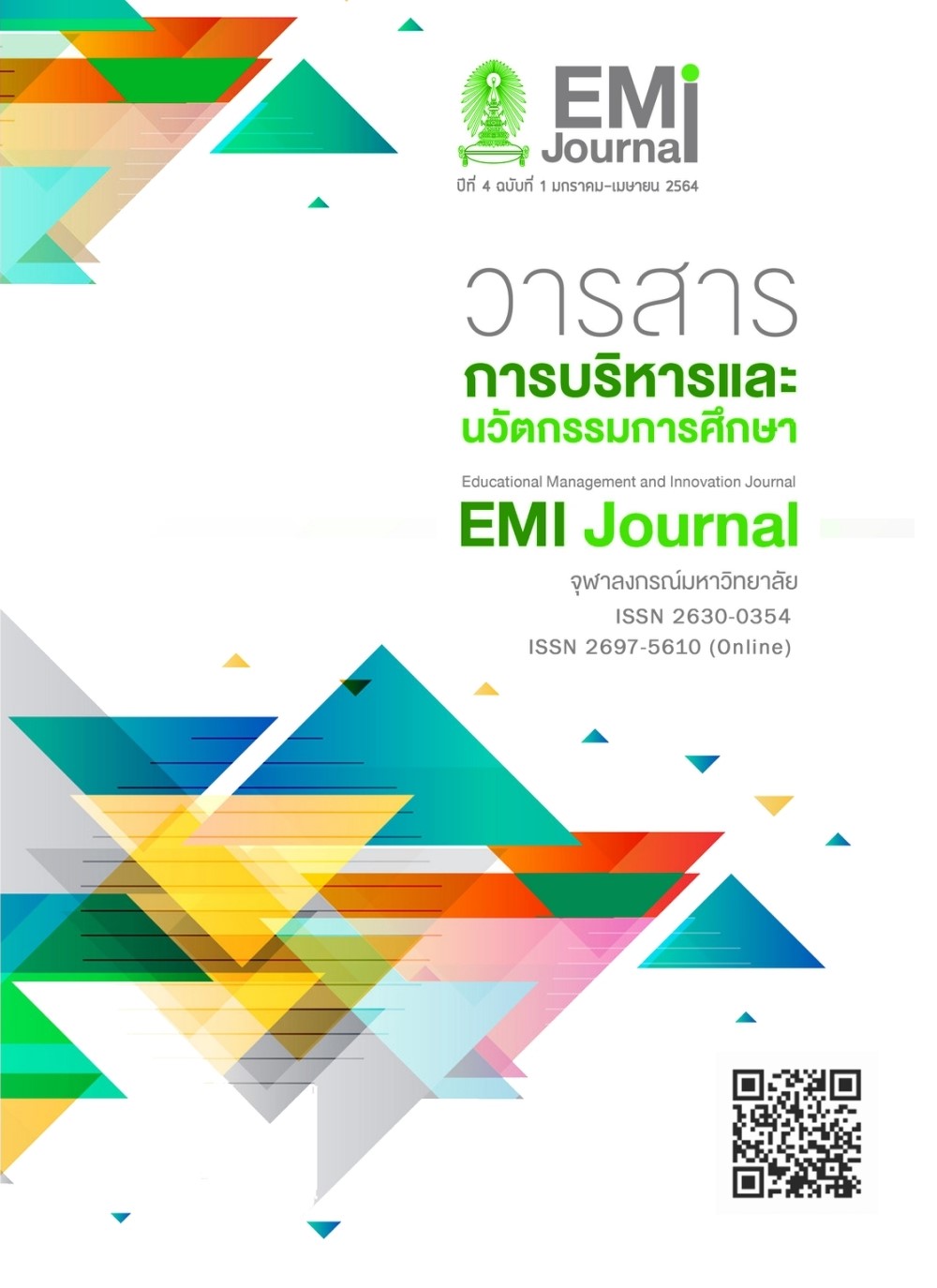Academic and Student Affairs Collaboration for Enhancing Students’ Future Work Skills in Cambodian Higher Education
คำสำคัญ:
Academic and student affairs collaboration, Future work skills, Higher education, Cambodiaบทคัดย่อ
-
Downloads
เอกสารอ้างอิง
Albrecht, K. (2006). Social intelligence: The new science of success. San Francisco: Pfeiffer.
Allen, T. O., Thompson, M. L., & Calderón Galdeano, E. (2019). Guidelines for fostering student affairs-academic affairs partnerships in Hispanic-serving institutions. New Directions for Student Services, 2019(167), 75-84. doi:10.1002/ss.20322
Ancona, D. (2011). Sensemaking: Framing and acting in the unknown. In S. Snook, N. Nohria, & R. Khurana (Eds.), The handbook for teaching leadership: Knowing, doing, and being. Thousand Oaks, CA: Sage.
Anderson, L. W., & Krathwohl, D. R. (Eds.). (2001). A revision of Bloom’s taxonomy of educational objectives. New York: Longman.
Bamel, U. K., Rangnekar, S., Rastogi, R., & Kumar, S. (2013). Organizational process as antecedent of managerial flexibility. Global Journal of Flexible Systems Management, 14(1), 3-15. doi:10.1007/s40171-013-0026-9
Bristol Community College. (n.a). Academic affairs. Retrieved from http://www.bristolcc. edu/bristolcommunity/facultystaff/academicaffairs/
Chaemchoy, S. (2019). School management in digital era [Thai]. Bangkok: Chulalongkorn University Press.
Chanpensri, A. (2015). A proposed collaborative model between academic affairs and student affairs for student development in Thai higher education institution. (Doctoral dissertation, Chulalongkorn University), Retrieved from http://cuir.car. chula.ac.th/handle/123456789/49821
Creamer, D., Winston, R. B., Miller, T., & Associates. (2001). The professional student affairs administrator: Educator, leader, and manager. New York: Brunner-Routledge.
Davies, A., Fidler, D., & Gorbis, M. (2011). Future work skills 2020. Palo Alto, California: Institute for the Future for University of Phoenix Research Institute.
Hirsch, D. J., & Burack, C. (2001). Finding points of contact for collaborative work. New Directions for Higher Education, 2001(116), 53-62. doi:10.1002/he.33
Hogan, L. T. (2016). Student affairs for academic administrators. Sterling, Virginia: Stylus Publishing.
HR Inc. (2010). Higher education and skills for the labor market in Cambodia [draft]. Retrieved from siteresources.worldbank.org/INTEASTASIAPACIFIC/ Resources/ Cambodia-HEandSkillsforLaborMarket.pdf
Jungblut, B. M., Bruni, R., & Maust, D. R. (2017). Working together: Academic affairs, student affairs, and institutional research. In N. A. Valcik & J. A. Johnson (Eds.), Institutional Research Initiatives in Higher Education (pp. 134-152). New York: Routledge.
Kapenieks, J. (2016). Educational action research to achieve the essential competencies of the future. Journal of Teacher Education for Sustainability, 18(1), 95-110. doi:https://doi.org/10.1515/jtes-2016-0008
Kezar, A. (2003). Achieving student success: Strategies for creating partnerships between academic and student affairs. NASPA Journal, 41(1), 1-22. doi:10.2202/1949-6605.1302
Kezar, A. (2016). Collaboration. In T. L. Hogan (Ed.), Student Affairs for Academic Administrators. Sterling, Virginia: Stylus Publishing.
Kezar, A., & Lester, J. (2009). Organizing higher education for collaboration: A guide for campus leaders. San Francisco: Jossey-Bass.
Madhur, S. (2014). Cambodia’s skill gap: An anatomy of issues and policy options. Phnom Penh: CDRI.
MoEYS. (2019). Education congress: The education, youth and sport performance in the academic year 2017-2018 and goals for the academic year 2018-2019. Phnom Penh: Author.
Nicolescu, B. (2012). The need for transdisciplinarity in higher education in a globalized world. Transdisciplinary Journal of Engineering & Science, 3, 11-18.
O'Halloran, K. C. (2019). A classification of collaboration betweeen student and academic affairs. College Student Journal, 53(3), 301-314.
Parekh, B. (2009). Multicultural society and convergence of identities. In J. E. Fossum, J. Poirier, & P. Magnette (Eds.), The Ties that Bind: Accommodating Diversity in Canada and the European Union (pp. 33-52). Brussel: P.I.E. PETER LANG S.A.
Peters Linda, M., & Manz Charles, C. (2007). Identifying antecedents of virtual team collaboration. Team Performance Management: An International Journal, 13(3/4), 117-129. doi:10.1108/13527590710759865
Rana, S., & Ardichvili, A. (2014). Cambodia and the ASEAN economic community: Opportunities, challenges, and implications for human resource development. Reconsidering Development, 3(1), 39-55.
Rany, S., Zain, A. N. M., & Jamil, H. (2012). Cambodia’s higher education development in historical perspectives (1863-2012). International Journal of Learning Development, 2(2), 224-241.
RUPP. (2018). Prospectus. Phnom Penh: Author.
Schuh, J. H. (1999). Guiding principles for evaluating student and academic affairs partnerships. New Directions for Student Services, 1999(87), 85-92. doi:10.1002/ss.8707
Senter, K. Y., & McClelland, A. (2015). Top ten workplace skills for future organizations. International Journal of Business Research and Management, 6(2), 20-32.
Un, L., & Sok, S. (2018a). Higher education governance in Cambodia: An update. In H. Casper-Hehne, E. Egron-Polak, M. F. Green, L. Matei, T. Nokkala, & L. Purser (Eds.), Internationalization of Higher Education (Vol. Special). Berlin: DUZ Academic.
Un, L., & Sok, S. (2018b). Higher education systems and institutions, Cambodia. In Encyclopedia of International Higher Education Systems and Institutions (pp. 1-10). Dordrecht: Springer Netherlands.
UNDP. (2011). Human capital implications of future economic growth in Cambodia: elements of a suggested roadmap. Phnom Penh: Author.
UNESCO. (2002). The role of student affairs and services in higher education. Paris: Author.
Weick, K. E. (1995). Sensemaking in organizations. Thousand Oaks, CA: Sage.
Weick, K. E., Sutcliffe, K. M., & Obstfeld, D. (2005). Organizing and the process of sensemaking. Organization Science, 16(4), 409-421.
Weng, W. (2015). Eight skills in future work. Education, 135(4), 419-422.
Wing, J. M. (2006). Computational thinking. Communications of the ACM, 49(3), 33-35.



